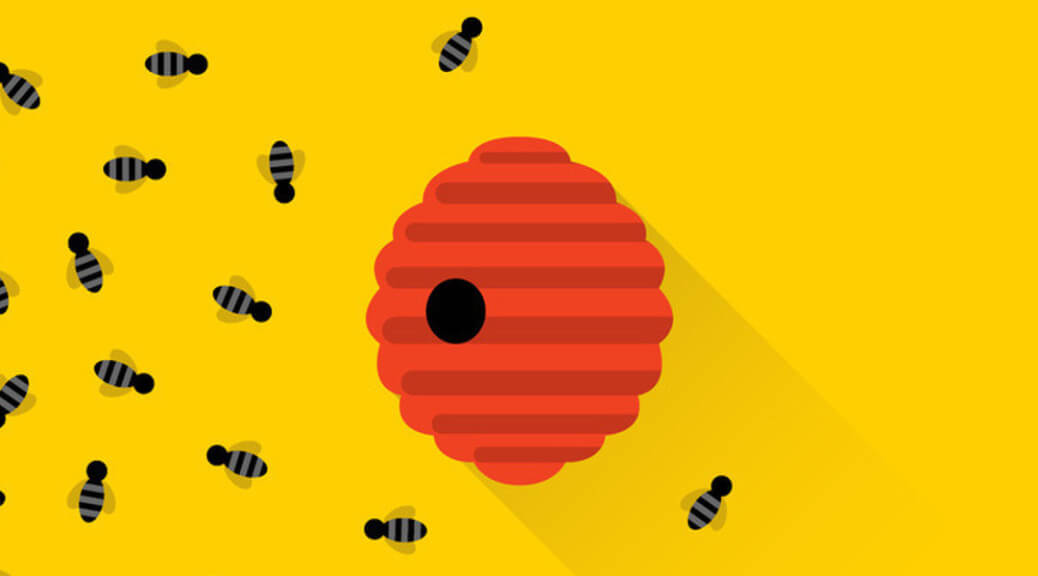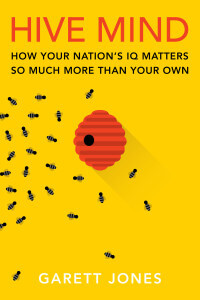
Garett Jones is Associate Professor of Economics and BB&T Professor for the Study of Capitalism at the Mercatus Center, George Mason University. His book, Hive Mind: How Your Nation’s IQ Matters so Much More than Your Own is the subject of this episode.
 The book deals with an empirical puzzle: IQ is a weak predictor for earnings. We all know high-IQ people who live paycheque to paycheque, and lower IQ people who succeed brilliantly. And yet, when we look at the relationship between nations’ average IQ scores and their incomes, the relationship is strong. Nations with the highest average IQ scores are eight times wealthier than nations with the lowest IQ scores. How can we resolve this apparent contradiction?
The book deals with an empirical puzzle: IQ is a weak predictor for earnings. We all know high-IQ people who live paycheque to paycheque, and lower IQ people who succeed brilliantly. And yet, when we look at the relationship between nations’ average IQ scores and their incomes, the relationship is strong. Nations with the highest average IQ scores are eight times wealthier than nations with the lowest IQ scores. How can we resolve this apparent contradiction?
Garett documents five main channels for the spillover effects of IQ:
1. Smarter people are more patient, they save more and build up more capital.
When economists test people’s patience, high-IQ people tend to be more willing to wait for a larger amount of money in the future rather than taking a smaller sum now. This is important at the national level because savings tend to stay within a country* and fund investments within that country. That means living in a higher IQ nation generally means having more capital available to compliment your labour.
2. Smarter groups are more cooperative.
Economists use the iterated prisoner’s dilemma as an idealized scenario where cooperation is at odds with people’s individual, short-term incentives. Jones looked at the many times economists have studied this in experiments and correlated the cooperation rate in these experiments with the SAT scores of the schools the study participants were drawn from. He found that higher SAT schools produced more cooperation in the iterated prisoner’s dilemma.
In later research, Al-Ubaydli, Jones, and Weel (2014) found that higher IQ groups were more cooperative, but higher IQ individuals were not. A high-IQ person in a low-IQ group would not foolishly cooperate when everyone else was defecting, but high-IQ groups could coordinate on a cooperative solution despite not knowing that they were in a high-IQ group.
3. Smarter people are more informed voters and are more likely to support market-oriented policies.
Caplan and Miller (2010) document the tendency for high-IQ people to think like economists.
4. Smarter groups make more productive team members.
Jones uses “O-ring” technologies (drawing on an idea from Kremer (1993)), in reference to the fatal part that cause the Challenger disaster, to show how high-IQ workers can be indispensable in many sectors of a modern economy. While many economic models assume substitutability between high- and low-skilled labour (e.g. three low-skilled workers can do the work of one high-skilled worker), O-ring sectors don’t have this feature. When one mistake can completely destroy a project, low-skilled workers can have effectively negative marginal products.
5. Peer effects cause those with high-IQ peers take on the behaviours of high-IQ people, implying that low-IQ people in high-IQ countries will be more patient, cooperative, informed, and productive than low-IQ people in low-IQ countries.
It’s well documented in the social science literature that people take on the behaviours of their peers. This effectively multiplies the positive effects of the first four channels by making low-IQ people behave like high-IQ people.
Jones sees a virtuous cycle between IQ and development. Higher IQs lead to better economic outcomes, and better economic outcomes lead to better health outcomes and higher IQs. But despite the great importance of this subject, people have been extremely reluctant to research differences in IQ between groups for fear of finding an unpalatable result. One of Jones’ aims in writing this book is to make it more acceptable for people to do research in this area.
We also discuss Jones’ recent debate with Bryan Caplan on the subject of open borders. Jones’ work on IQ spillover effects give us reason to use caution in supporting open borders.
*This is actually another economic “paradox” that economists don’t fully understand. One would expect savings to be invested where they face the highest returns, regardless of national boundaries, but that seems not to be the case.
REFRENCES
Al-Ubaydli, O., Jones, G., & Weel, J. (2014). Average player traits as predictors of cooperation in a repeated prisoner’s dilemma.
Caplan, B., & Miller, S. C. (2010). Intelligence makes people think like economists: Evidence from the General Social Survey. Intelligence, 38(6), 636-647.
Jones, G. (2008). Are smarter groups more cooperative? Evidence from prisoner’s dilemma experiments, 19592003. Journal of Economic Behavior & Organization, 68(3), 489-497.
Kremer, M. (1993). The O-ring theory of economic development. The Quarterly Journal of Economics, 551-575.
Subscribe to Economics Detective Radio on iTunes or Stitcher.
The post Hive Mind, IQ, and the Wealth of Nations with Garett Jones appeared first on The Economics Detective.


